

Aurora. 正義女神像 隨著九月初台灣伴侶權益推動聯盟(簡稱伴侶盟)在凱達格蘭大道上伴桌造勢,並且預備將多元成家民法修正案送入立法院,在苦勞網上有一系列對於同志婚姻、婚姻家庭的討論,從開始是同志家庭權益促進會(簡稱同家會)對於伴侶盟的修正草案表示不同意見,以及對於先前在苦勞網上對於美國同志婚姻運動的反思的反思(我知道這有一點繞口),然後是走毀家廢婚、酷兒運動的路線的學者和記者的回應─這篇、和這篇─還有從其他運動角度的思考(我都不認識他們,所以只好用文章上的職稱來代稱了),最後是同家會成員再度的回應。
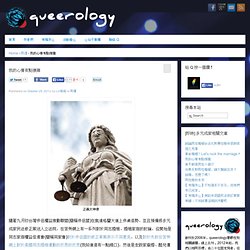
這個討論大概可以分成兩個部分,一個是討論到底要不要用力推動婚姻平權或多元成家的運動,一個是在要推動的前提下,該怎麼推才好的討論。 我覺得對於前者的討論,目前為止我沒甚麼多餘的可說,但是對於後者,在看完伴侶盟的在苦勞網的回應之後,我覺得我很想說點話。 話先說在前頭,Queerology是個自由的地方,原則上不審常任作者的稿,所以這篇文章也僅是我個人的思考總結,不代表blog的官方立場喔! 老實說,我覺得我的心情有點複雜。 對於伴侶盟的法案,同家會的異議主要來自於對於伴侶制度中,對於子女婚生推定、財產制度、伴侶關係解除時的家務勞動利益的請求權等等的預設規定。 How feminism became capitalism's handmaiden - and how to reclaim it. As a feminist, I've always assumed that by fighting to emancipate women I was building a better world – more egalitarian, just and free.
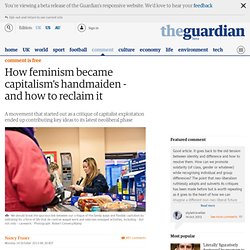
But lately I've begun to worry that ideals pioneered by feminists are serving quite different ends. I worry, specifically, that our critique of sexism is now supplying the justification for new forms of inequality and exploitation. In a cruel twist of fate, I fear that the movement for women's liberation has become entangled in a dangerous liaison with neoliberal efforts to build a free-market society.
That would explain how it came to pass that feminist ideas that once formed part of a radical worldview are increasingly expressed in individualist terms. Where feminists once criticised a society that promoted careerism, they now advise women to "lean in". What lies behind this shift is a sea-change in the character of capitalism. Feminism has also made a second contribution to the neoliberal ethos. 性、勞動與新工會主義: 荷安柏與辛尼帕爾一席談(下) 責任主編:王顥中 翻譯:楊雅婷/校訂:何春蕤 荷安珀(Amber Hollibaugh)是社會運動組織者、作家,也是製片,致力耕耘愛滋與情慾議題;辛尼帕爾(Nikhil Pal Singh)是西雅圖華盛頓大學歷史學助理教授。
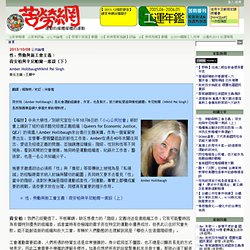
Amber Hollibaugh 【編按】中央大學性/別研究室在今年10月6日的「小心公民社會」研討會上請到了紐約追求酷兒經濟正義組織(Queers for Economic Justice, QEJ)的領導人Amber Hollibaugh來台進行主題演講。 作為一個貧窮背景出生,吉普賽─愛爾蘭混血的前性工作者,Amber在過去40年來關注同志、愛滋及經濟正義的問題,並強調應從種族、階級、性別和性等不同視角,看到其間的交會複雜。 性、勞動與新工會主義: 荷安柏與辛尼帕爾一席談(上) 責任主編:王顥中 翻譯:楊雅婷/校訂:何春蕤 荷安珀(Amber Hollibaugh)是社會運動組織者、作家,也是製片,致力耕耘愛滋與情慾議題;辛尼帕爾(Nikhil Pal Singh)是西雅圖華盛頓大學歷史學助理教授。
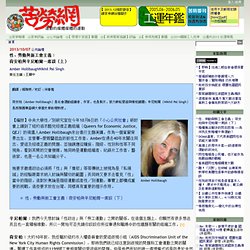
Amber Hollibaugh 【編按】中央大學性/別研究室在今年10月6日的「小心公民社會」研討會上請到了紐約追求酷兒經濟正義組織(Queers for Economic Justice, QEJ)的領導人Amber Hollibaugh來台進行主題演講。 作為一個貧窮背景出生,吉普賽─愛爾蘭混血的前性工作者,Amber在過去40年來關注同志、愛滋及經濟正義的問題,並強調應從種族、階級、性別和性等不同視角,看到其間的交會複雜。 她要求激進政治必須將「性」與「情慾」等等傳統上被視為是「私領域」的經驗跟需求納入討論與關切的範圍;而同時又要求去看見「性」當中的階級。 性、勞動與新工會主義:荷安柏與辛尼帕爾一席談(下) 辛尼帕爾:我們今天想討論「性政治」與「勞工運動」之間的關係。 荷安柏:大約10年前,我任職於紐約市人權委員會的愛滋歧視小組(AIDS Discrimination Unit of the New York City Human Rights Commission),那時我們就已經注意到歧視的問題和工會運動之間的關連。 我曾經遇到過一位在某市政工會工作多年的商務代理人,他非常害怕,因為他尚未公開表明自己的性傾向。 我問自己:我們在工會運動之內要如何才能開始針對嗑藥和性的問題進行一場不一樣的對話? 美國勞工聯合會-產業工會聯合會(AFL-CIO, The American Federation of Labor and Congress of Industrial Organizations)最新也最有趣的組織策略並不只考量經濟,而是非常具體而長期的以建立社群為目標。
辛尼帕爾:這就牽涉到組織起現代資本主義的基本區分──也就是「公私之分」。 Sick of pink - The Boston Globe - Aurora. When Kim Zielinski was diagnosed with breast cancer in 2007 at the age of 33, well-meaning friends inundated her with products bearing a little pink ribbon.
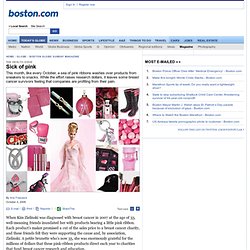
Each product’s maker promised a cut of the sales price to a breast cancer charity, and these friends felt they were supporting the cause and, by association, Zielinski. A petite brunette who’s now 35, she was enormously grateful for the millions of dollars that these pink-ribbon products direct each year to charities that fund breast cancer research and education. But it wasn’t long before she got a little sick of the pink. “I felt kind of hateful,” says the insurance company sales manager who lives in Charlestown.
“I was like, ‘What makes you think I like pink now?’ “I think that the pink ribbon, as a symbol, tends to pretty up what is a pretty crappy disease. Many breast cancer survivors like Zielinski find themselves conflicted over this little powerful ribbon. “But personally,” says Johnson, “I cringe when I see that stuff. Signs, Vol. 25, No. 3 (Spring, 2000), pp. 789-816 - Aurora. When Men Get All the Credit: Gender and the Construction of Knowledge - Aurora. By Peter Kaufman There is a common theme that often plays out in television sitcoms and movies that goes something like this: A wife and husband are trying to accomplish a task—maybe trying to put something together or convey a life-lesson to their children.
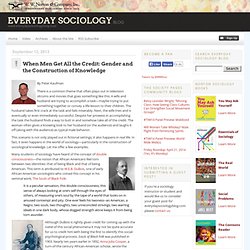
The husband takes first crack at the task and fails miserably. Next, the wife tries and is eventually or even immediately successful. Despite her prowess in accomplishing the task the husband finds a way to butt in and somehow take all of the credit. The woman often gives a knowing look to her husband (or the audience) and laughs it off (along with the audience) as typical male behavior. This scenario is not only played out in fictional settings; it also happens in real life. Many students of sociology have heard of the concept of double consciousness—the notion that African Americans feel torn between two identities: that of being Black and that of being American.
The cases of W.E.B. Most students of sociology know C.